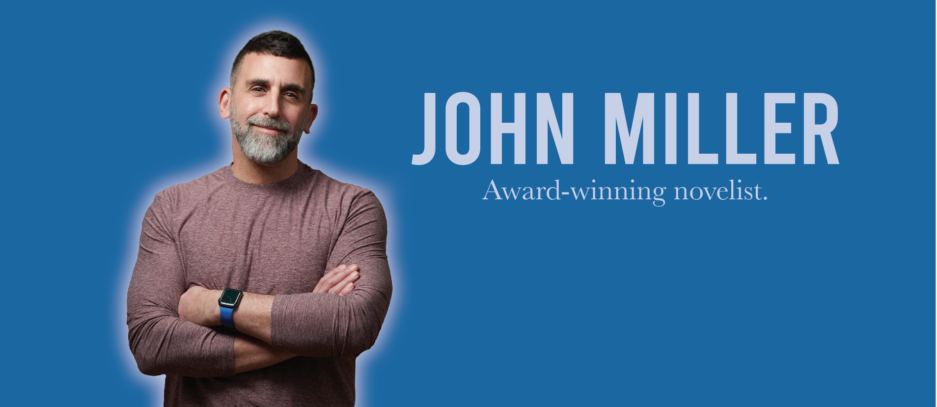John Miller is the award-winning author of three novels of literary fiction: Wild and Beautiful is the Night (Cormorant, 2018); A Sharp Intake of Breath (Dundurn, 2007), which won the 2008 Beatrice and Martin Fischer Award in Fiction; and The Featherbed (Dundurn, 2002).
Ten novels that have staying power (with an extra 5 for good measure)
 My brother Tony challenged me to name 10 books that have stayed with me over time. I am in a longstanding writing group, Big Canvas, with Elizabeth Ruth and Sally Cooper and that I shamelessly promote their writing because they are outstanding novelists.
My brother Tony challenged me to name 10 books that have stayed with me over time. I am in a longstanding writing group, Big Canvas, with Elizabeth Ruth and Sally Cooper and that I shamelessly promote their writing because they are outstanding novelists.
Continue reading
Telling a story? Please, go easy on the facts.
 Once, when our family was gathered at my parents’ house for dinner, my brother accused me of being an anti‑social worker. At the time, I worked in what people condescendingly call ‘the helping professions’. His little jab disappointed me; I did inform them, after all, that I had been telling a story. Did they really expect the humdrum reporting of facts?
Once, when our family was gathered at my parents’ house for dinner, my brother accused me of being an anti‑social worker. At the time, I worked in what people condescendingly call ‘the helping professions’. His little jab disappointed me; I did inform them, after all, that I had been telling a story. Did they really expect the humdrum reporting of facts?
Continue reading
A flight attendant who could learn to whisper
 Flight attendant, loudly, to her seated colleague on the other side of the plane: “Is that smoke? I smell smoke!” Her colleague agrees. Minutes pass as my heart races. “It’s getting worse! Has anyone told the captain?” she gets up and strides quickly to the cockpit.
Flight attendant, loudly, to her seated colleague on the other side of the plane: “Is that smoke? I smell smoke!” Her colleague agrees. Minutes pass as my heart races. “It’s getting worse! Has anyone told the captain?” she gets up and strides quickly to the cockpit.
These are things you really *don’t* want to hear and see as your flight has just taken off, especially after a 3-hour delay due to electrical storms that the crew have been describing as “a code red situation” –a delay that has definitely eaten up your connection time to catch your flight to Nairobi. Continue reading
Malaysia 20 years later
 I’ll be going to Kuala Lumpur this July for a conference—a very different experience from my last trip twenty years ago during a backpacking adventure through Indonesia, Malaysia and Thailand. Though I’ll be heading to a meeting where treatment advances in HIV will be discussed, my hotel will be comfortable, I’ll be stuck in a conference centre and I will no doubt feel very much removed from the lives or ordinary Malaysians. Continue reading
I’ll be going to Kuala Lumpur this July for a conference—a very different experience from my last trip twenty years ago during a backpacking adventure through Indonesia, Malaysia and Thailand. Though I’ll be heading to a meeting where treatment advances in HIV will be discussed, my hotel will be comfortable, I’ll be stuck in a conference centre and I will no doubt feel very much removed from the lives or ordinary Malaysians. Continue reading
Remembering through stories
 The events of Sandy Hook Elementary and other tragedies have me thinking again how storytelling can help heal. Twenty-four years ago, I lost my best friend to gun violence. Naomi was a bright soul extinguished at twenty-one and for a few years after her death, her mother and I met occasionally to check in and reminisce. Then one day I received a letter. Naomi’s mother explained that she had spent the better part of a year writing a small booklet, and would I like to receive a copy. She had written her daughter’s story, she said.
The events of Sandy Hook Elementary and other tragedies have me thinking again how storytelling can help heal. Twenty-four years ago, I lost my best friend to gun violence. Naomi was a bright soul extinguished at twenty-one and for a few years after her death, her mother and I met occasionally to check in and reminisce. Then one day I received a letter. Naomi’s mother explained that she had spent the better part of a year writing a small booklet, and would I like to receive a copy. She had written her daughter’s story, she said.
Her daughter’s story. At first, the phrasing rankled. Surely one story couldn’t possibly suffice. Furthermore, the attribution seemed wrong. In English, we have a convention of naming a story that is about a person after the person, but any writer knows that a story first belongs to the teller and once told becomes shared property. Finally, it seemed too definitive. Where was the room for my point of view? Continue reading
